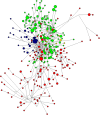Exploring the mitochondrial DNA ancestry of patients with type 1 diabetes from an admixed population of the Northeast of Brazil
- PMID: 40596209
- PMCID: PMC12217787
- DOI: 10.1038/s41598-025-05990-2
Exploring the mitochondrial DNA ancestry of patients with type 1 diabetes from an admixed population of the Northeast of Brazil
Abstract
Mitochondrial DNA is a stable genetic marker that can be used to investigate maternal ancestry. Some evidence suggests a potential link between specific mtDNA haplogroups and the emergence of certain diseases. Nevertheless, this correlation has yet to be investigated in patients with T1D. This study aimed to investigate the mitochondrial DNA (mtDNA) ancestry of patients with type 1 diabetes (T1D) and controls in an admixed Brazilian population. The study included 144 patients with T1D and 283 controls. The mtDNA analysis revealed that the most prevalent mtDNA category in both groups was Native American, followed by African. Furthermore, the study showed that the frequency of haplogroup L3 (African) was higher in the T1D group than in the control group, although this difference was not statistically significant after correction for multiple comparisons. The study findings indicate that the higher frequency of Native American and African mtDNA is consistent with historical information about the formation of the population in the State of Maranhão. This finding suggests that future investigations into the correlation between mtDNA and other genetic markers of T1D may offer insights into the etiology and pathogenesis of the disease in admixed populations, such as those in Brazil.
Keywords: Admixed population; Ancestry; Mitochondrial DNA; Type 1 diabetes.
© 2025. The Author(s).
Conflict of interest statement
Declarations. Competing interests: The authors declare no competing interests. Ethical approval: This study was performed in line with the principles of the Declaration of Helsinki. Approval was granted by the Ethics Committee of the University Hospital of the Federal University of Maranhão (HUUFMA), under opinion number 59795116.9.0000.5086. All participants or their legal representatives were informed about the study’s objectives and procedures and signed the free and informed consent form.
Figures



Similar articles
-
mtDNA structure: the women who formed the Brazilian Northeast.BMC Evol Biol. 2017 Aug 9;17(1):185. doi: 10.1186/s12862-017-1027-7. BMC Evol Biol. 2017. Retraction in: BMC Ecol Evol. 2025 Jul 28;25(1):73. doi: 10.1186/s12862-025-02427-2. PMID: 28793858 Free PMC article. Retracted.
-
Sexual Harassment and Prevention Training.2024 Mar 29. In: StatPearls [Internet]. Treasure Island (FL): StatPearls Publishing; 2025 Jan–. 2024 Mar 29. In: StatPearls [Internet]. Treasure Island (FL): StatPearls Publishing; 2025 Jan–. PMID: 36508513 Free Books & Documents.
-
The Black Book of Psychotropic Dosing and Monitoring.Psychopharmacol Bull. 2024 Jul 8;54(3):8-59. Psychopharmacol Bull. 2024. PMID: 38993656 Free PMC article. Review.
-
Systemic treatments for metastatic cutaneous melanoma.Cochrane Database Syst Rev. 2018 Feb 6;2(2):CD011123. doi: 10.1002/14651858.CD011123.pub2. Cochrane Database Syst Rev. 2018. PMID: 29405038 Free PMC article.
-
Home treatment for mental health problems: a systematic review.Health Technol Assess. 2001;5(15):1-139. doi: 10.3310/hta5150. Health Technol Assess. 2001. PMID: 11532236
References
MeSH terms
Substances
LinkOut - more resources
Full Text Sources
Medical

